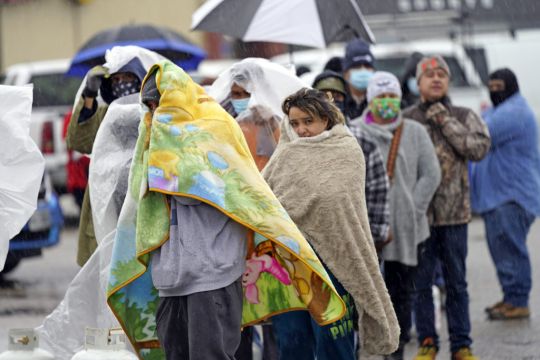Power cuts in Texas fell below one million on Thursday morning for the first time in four days, but many people remained without electricity or safe drinking water after winter storms wreaked havoc on the state’s power grid and utilities.
This week’s extreme weather has been blamed for the deaths of more than 30 people, some of whom perished while struggling to keep warm inside their homes.
In the Houston area, one family succumbed to carbon monoxide poisoning from a car exhaust in their garage. Meanwhile, a grandmother and three children died when flames escaped the fireplace they were using to keep warm.
Snow/ice will spread from the South Plains into the Mid-Atlantic and Northeast. Bitter cold continues. Isolated severe storms could produce a couple of tornadoes today in the central Gulf Coast & tomorrow in the Southeast. Rain with heavy mountain snow in the Northwest. pic.twitter.com/YLUWKk3Rr1
— National Weather Service (@NWS) February 18, 2021
Advertisement
In Texas, about 560,000 homes and businesses were still without electricity on Thursday morning, down from about three million the day before.
But the power grid manager for Texas, under fire for its response to the winter storm, has warned that the cuts could fluctuate during hours of peak energy demand.
Adding to the misery, the snowy weather has jeopardised drinking water systems throughout the state.
Texas officials ordered seven million people — a quarter of the population of the nation’s second largest state — to boil tap water before drinking it following days of record low temperatures that have damaged infrastructure and frozen pipes.

In Austin, some hospitals faced a loss in water pressure and in some cases, heat.
Water pressure has fallen across the state because lines have frozen, and many residents are leaving faucets dripping in hopes of preventing pipes from freezing, Toby Baker, executive director of the Texas Commission on Environmental Quality, said.
Texas governor Greg Abbott urged residents to shut off water to their homes, if possible, to prevent more burst pipes and to preserve pressure in municipal systems.
Weather-related power cuts have been particularly stubborn in Oregon, where some customers have been without power for almost a week.
A Portland supermarket without power threw perishable food into a skip, leading to a clash between scavengers and police.

The damage to the power system was the worst in 40 years, Maria Pope, chief executive of Portland General Electric (PGE) said.
At the peak of the storm, more than 350,000 customers in the Portland area were in the dark.
And more than 100,000 customers remained without power on Thursday in Oregon.
“These are the most dangerous conditions we’ve ever seen in the history of PGE,” Dale Goodman, director of utility operations, said.
Utilities from Minnesota to Texas have implemented rolling blackouts to ease the burden on strained power grids.

The Southwest Power Pool, a group of utilities covering 14 states, said the blackouts were “a last resort to preserve the reliability of the electric system as a whole”.
The weather also disrupted water systems in several southern cities, including in New Orleans and Shreveport, Louisiana, where city fire engines delivered water to several hospitals, and bottled water was being brought in for patients and staff, Shreveport television station KSLA reported.
Louisiana governor John Bel Edwards sought a presidential emergency declaration on Wednesday evening, seeking federal money and supplies in response to extended power cuts in his state.
Meanwhile, heavy snow and ice were expected on Thursday in the Appalachians, northern Maryland and southern Pennsylvania, with the wintry weather moving into the northeast by nightfall.
In Little Rock, Arkansas, 15 inches of snow lay on the ground on Thursday after back-to-back storms, tying a record for snow depth set in 1918, the National Weather Service said.







